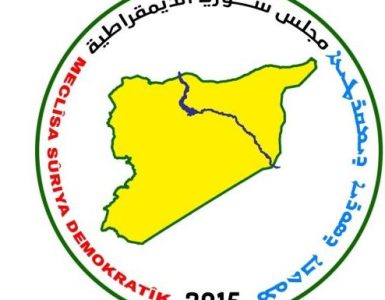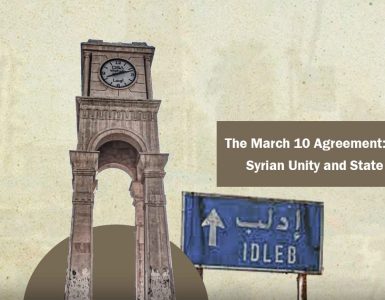A group of Syrian women discussed the concept of the inclusive national identity on Saturday as one of the ways to reach consensus among Syrians and achieve a peaceful resolution during the dialogue meeting held by the Union of Raqqa intellectuals and under the auspices of the Syrian Democratic Council in the city of Raqqa on the banks of the Euphrates River.
The session was began after the opening speech and the presentation of the national identity paper, which was read by Dobiya Al-Nasser, the administrator of the Women’s Bureau of the Syrian Democratic Council, as the session included the concept of identity in its terminological and theoretical frameworks and forms, national identity in the contemporary history of Syria, and the principles and importance of the Syrian national identity and its elements, based on the social and historical reality achieved in the country and the responsibility of women to find possible resolutions for the Syrian crisis.
Al-Nasser also pointed out the steps of the work and its start such as the reconstruction of various infrastructure, structuring, education, the establishment of civil peace committees, awareness and empowerment of women in all fields, and their participations in international forums.
For her part, Janda Muhammed, a representative of the coordination of the Women’s Bureau of the SDC, spoke about the right of Syrians to have an inclusive national identity, as it is “the way to reach a homeland of dignity in which women are the bearers of the banner of dignity, which requires more awareness, courage and solidarity because the real resolution for the Syrian crisis must be for the Syrian society to make a real fundamental change that reduces the causes of crises and non-repetition them”.
For her part, Layla Muhammed, the Co-chairwoman of the Education Authority in Tabqa, pointed out that many people claim that the Syrian identity before the crisis was fine, and these claims were surprising because if that identity was not fake, we would not have reached to this stage of conflicts, lack of acceptance of others and suppression of wealth and cultural heritage.
Muhammed continued that the criterion of belonging to the homeland and obtaining the inclusive identity is as much as everyone offers to this homeland.
Meanwhile, Julia Abu Asali, a member of the Women’s Bureau of the Syrian Brigade party, addressed the suffering of thousands of widows and wives of missing persons in light of the country’s crisis, and that women have suffered the most because of this war, and that Syria today must bring us together to build a unite homeland that is reconciled with history and renewed with its changes.
While Shirin Saeed, a lawyer and feminist activist who participated in the session via the Zoom application, addressed the concept of identity as it is not a fixed thing, especially in light of challenges, but rather to work on building an inclusive national identity and to initiate a consensual and participatory political process will lead to peace according to a new social contract.
It is worth mentioning that the participations were diverse and numerous by the women present, most of them focused on the importance of the role of Syrian women in building an inclusive national identity, and there were women participants from Egypt, Lebanon, Morocco and Sudan via the Zoom application.



















